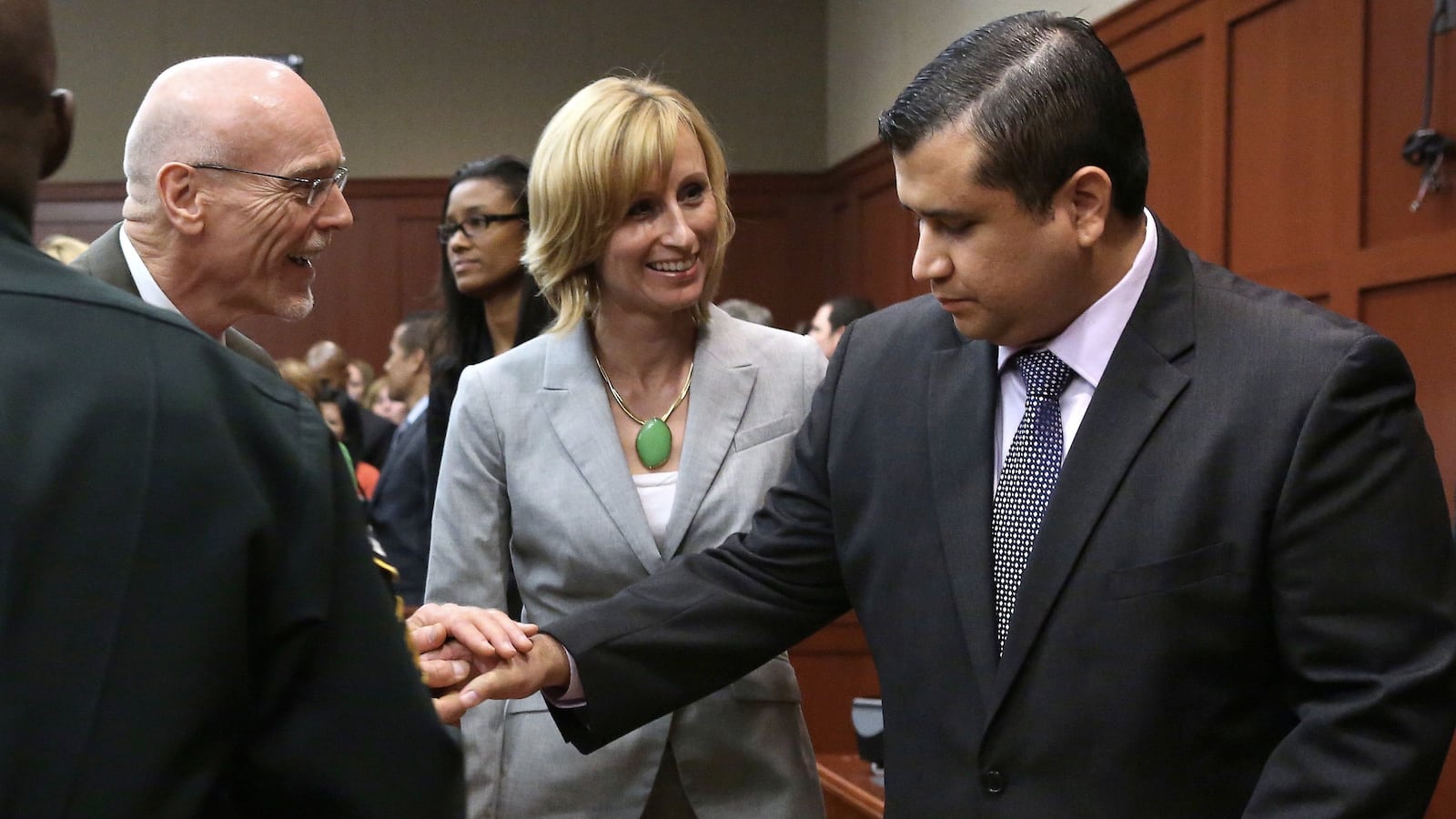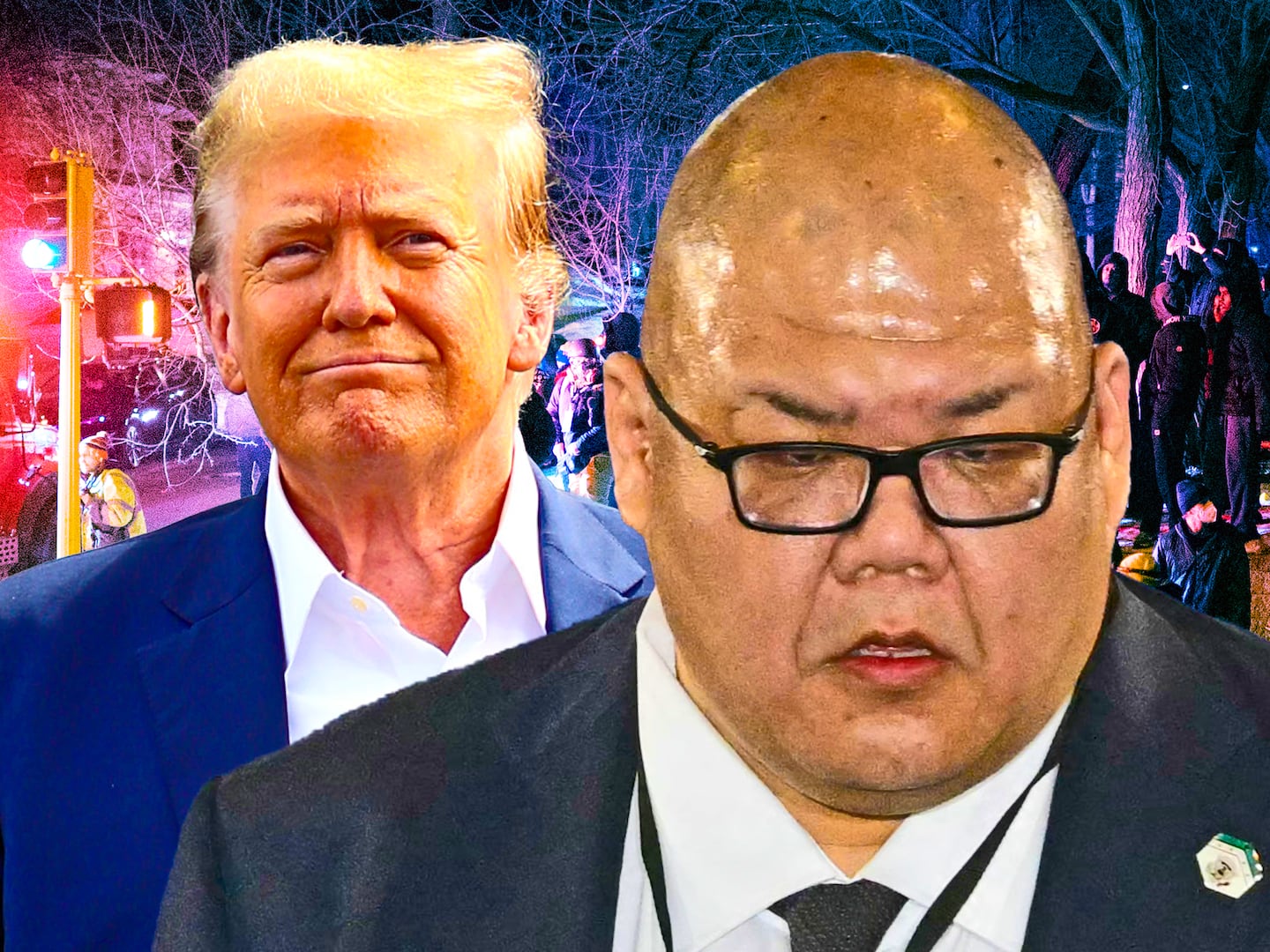It opened with a "knock-knock" joke and concluded with an even more controversial punchline. After three weeks of evidence from 56 witnesses, the trial of George Zimmerman ended in his acquittal late Saturday, bringing tears, jeers and devastation for the family and supporters of his teenage victim, Trayvon Martin.
"Even though I am broken hearted my faith is unshattered I WILL ALWAYS LOVE MY BABY TRAY," Martin's father, Tracy, tweeted after the verdict was announced.
Zimmerman, 29, a neighborhood watch volunteer, was found not guilty of the murder of the Florida 17-year-old, whom he shot after wrongly assuming that the boy was “up to no good.” Six female jurors sitting at Seminole County Criminal Justice Center in Sanford took more than 16 hours to decide their verdict.
The defendant had sat pensively as jurors filed in to deliver their verdict. He smiled only slightly and turned to shake hands with his attorneys. His wife Shellie wept. His parents embraced the attorneys and then their son. “You have no further business with the court,” the judge told him.
The dead teenager’s parents, Sybrina Fulton and Martin, who mounted a campaign for justice after police in Sanford initially declined to charge Zimmerman last year, citing his claim that he was set upon by the boy and that he resorted to “justifiable deadly force” only in self-defense, were not in the courtroom for the verdict.
Jurors—who, to convict for second-degree murder, would have had to find that Zimmerman acted out of “ill will, hatred, spite or an evil intent”—also dismissed a lesser charge of manslaughter.
Darryl Parks, an attorney for Martin's family, said that the boy's parents were "heartbroken." They stayed away from court for the verdict and stayed instead "in a safe place," ready to attend church and pray for their son on Sunday. Their campaign for justice had made Sanford and other cities "just a little safer for all our children," he said.
"To everybody who put their hoodies up, and to everybody who said 'I am Trayvon,' his family express their heartfelt gratitude," Parks added, saying that the family also wanted to urge calm.
The case would go down in the annals of civil-rights history as a "symbol of the fight for justice for all," he said, as civil-rights leaders including Rev. Al Sharpton announced that they would be heading to Sanford to be with the community in the coming days. Sharpton stated: "The acquittal of George Zimmerman is a slap in the face to the American people."
Benjamin Crump, who also represents Martin's family, said that the case illustrated how far America had or had not come when it came to equal justice for all and raised questions about "how we get better as a country and move forward."
"We would be intellectually dishonest if we didn't acknowledge the racial undertones in this case," he said.
Jurors looked stone-faced and solemn as the verdict was read. Prosecutors looked even more so. One of them—Richard Mantei—hurried from the room immediately after the verdict with tears in his eyes. Colleague John Guy shook hands solemnly with Zimmerman's counsel and murmured, "Congratulations."
Angela Corey, the state prosecutor who pressed the charges against Zimmerman after an investigation last year, said at a press conference in the courthouse that she and her team were still "proud " of the way they had conducted their case and that they respected the verdict.
"We promised that we would seek the truth for Trayvon Martin and due process for George Zimmerman, that we would get all of the facts and details of this very difficult case before a jury," she said. Placing all the evidence before the public at trial, rather than "in bits and pieces" meant that "now they know and can make up their own minds about the guilt or innocence of George Zimmerman."
"To the living we owe respect and to the dead we owe the truth. We have been respectful for the living, we have done our best to ensure due process for all involved, and we believe that we brought out the truth for Trayvon Martin."
But defense co-counsel Don West said that the prosecution of Zimmerman had been "a disgrace."
"I'm gratified by the jury's verdict. As happy as I am for George Zimmerman, I'm thrilled that this jury kept this tragedy from becoming a travesty. It makes me sad too that it took this long, under these circumstances, to finally get justice." His client had endured "16 months of trauma and distress" but was now elated with the result and looking forward to "getting his life back."
Asked if he had a message for the family of the teenager who would not be doing so, lead defense attorney Mark O'Mara repeated his insistence that it was Martin, and not Zimmerman, who began the fatal fight that night. "George did nothing wrong and he was beaten and battered by a 17-year-old....Nothing supports the evidence that George was the aggressor. "
He extended sympathies to the victim's family. "This is a tragedy like many other losses of children. It's just not one that George Zimmerman is responsible for," he said.

Outside the courthouse, supporters of Martin's family jeered, wept, or knelt in prayer as the verdict came. They carried banners with messages calling for "Justice for Trayvon" and "Zimmerman is guilty.”
"This was a trial about protecting our children. A not guilty verdict is equal to saying we're not going to protect our children, we're not going to stand up and hold George Zimmerman accountable for what he did to that child,” said Flora Reece, 47, a mother of one.
"That could have been my child. Last I knew, WWB isn’t a crime—Walking While Black. The message from a not guilty verdict in this case is that there's one set of standards for one side of the aisle and another set of standards for the other and that's not good for America. God has taken his hands off America. We're an unprotected nation now."
But Melissa Waz, 40, said the case was not about race. She spent the day outside the court holding a banner that stated, 'It doesn't matter what this sign says, you'll still call it racism anyway.'
"Me being here isn't even about supporting George Zimmerman, it's about fighting injustice and I don't think this case should have ever come to trial. Before the trial began, I thought he was guilty. I've listened day by day to the evidence and it wasn't until then that I felt it was cut and dried—not guilty."
Zimmerman was charged six weeks after the killing after Florida Governor Rick Scott appointed a special prosecutor, Angela Corey, to look into the case.
Both families, and local law enforcement chiefs, appealed for public calm, fearing that the verdict could inflame racial tensions in Sanford, 30 percent of whose community is black, and elsewhere including Miami, Martin’s hometown.
The public perception was that racial prejudice had driven the shooting, which occurred as the boy strolled to his father’s home after an evening trip to a local store to buy Skittles candies and a drink, and Zimmerman, seeing him wandering between homes in a neighborhood that had suffered a spate of break-ins, decided he looked “suspicious.”
“These assholes, they always get away,” he muttered under his breath during a telephone call to a police dispatcher as he monitored Martin. “Fucking punks,” he added later in the same call.
Martin was black and wearing a hoodie; Zimmerman is of mixed white and Hispanic heritage. The incident drove a national debate about race relations in America.
Civil rights leaders including Martin Luther King III and Reverend Al Sharpton joined Martin’s parents to spearhead rallies after the shooting, at which protesters wore hoodies and held banners that read “We are all Trayvon Martin.”

Even President Obama joined the race-orientated dialogue after the incident, noting that “If I had a son, he would look like Trayvon Martin,” and the Department of Justice deployed its Community Relations Service—a unit established by the Civil Rights Act of 1964 as a “peacemaker” to resolve race-based community conflicts—to Sanford.
But while Zimmerman had wrongly “profiled” the boy when he first set eyes on him that night, “this case isn’t about race,” state attorney John Guy told jurors during the trial’s closing argument. “It’s about right and wrong, it’s that simple.”
Martin, he said, was a child who “had every right to be where he was … every right to be doing what he was doing”—which was walking to his father’s house in the gated, middle-income community of The Retreat at Twin Lakes, in Sanford.
“He was a son, he was a brother, he was a friend, and the last thing he did on this Earth was try to get home,” Guy told the jury, fleshing out lead prosecutor Bernie de la Rionda’s characterization of Zimmerman as a gun-toting vigilante who, instead of waiting for police to arrive after he called them, left his car and followed the boy.
“Why? Because he’s got a gun, he’s got the equalizer, he’s gonna take care of it, he’s a wannabe cop,” said Mr de la Rionda, who also accused Zimmerman of having changed his version of events several times.
But Zimmerman’s lead counsel, Mark O’Mara, asserted that his client had been the underdog, and not the aggressor, and that the impression of Martin as a defenseless victim was wrong. The teenager had thrashed Zimmerman’s head so hard on the sidewalk after punching him in the face and wrestling him on the ground, that he was forced to resort to deadly force to save himself, he said.
“It’s a tragedy, truly, but you can’t allow sympathy to feed into it,” said O’Mara during closing statements.
“That’s not an unarmed teenager with nothing but Skittles trying to get home. He was somebody that used the availability of dangerous items, from his fist to the concrete, to cause great bodily injury against George Zimmerman.”
The case was so high-profile that jury selection alone took two weeks. O'Mara co-counsel, Don West, had opened the defense's trial controversially with a joke. “Knock, knock, who's there? George Zimmerman. George Zimmerman who? You're on the jury.”
But despite 39 witness testimonies, the state never quite seemed to convince itself of its own case, let alone jurors, leaving “reasonable doubt” in abundance.
They played tape in court of a 911 call from a resident on which a man was heard bellowing for help in the background. It was Martin, they said, putting the young man’s mother on the witness stand to say as much. No it wasn’t, said Zimmerman’s parents, testifying for the defense, along with a host of friends and colleagues; it was their boy George. Zimmerman himself had seemed confused during a police interview last year, in which he told a detective that it “doesn’t even sound like me,” but later decided it was.
Local residents who had glimpsed the men struggling on the ground also gave evidence, but their accounts differed as to whether Zimmerman was on top of Martin, or vice versa.
Then there was the gunshot itself. The medical examiner who performed the autopsy said that the gun had been pressed against Martin's chest when it was fired; not so, testified star defense witness Vincent DiMaio, a renowned expert on gunshot wounds. The bullet fired from the Kel-Tec 9mm semi-automatic pistol passed through the boy’s two sweatshirts in a manner that proved his clothing was hanging two to four inches from his chest, consistent with Zimmerman’s claim that Martin was on top of him at the time, leaning over him in combat.
A medical examiner for the prosecution told the court that Zimmerman’s injuries were “insignificant” and not symptomatic of him having received a thrashing before he fired the fatal bullet. But DiMaio said the opposite; they were serious, and consistent with the accused’s claim that Martin had pounded his head on the sidewalk.
Martin’s parents were present in the courtroom throughout the trial, sitting stoically in the front row, but occasionally looking away or leaving briefly when images of their dead son were shown.
His mother, Ms. Fulton, issued daily messages to supporters on her Twitter feed, expressing her love for her son, her religious faith, and her hope for justice for “my Angel Trayvon.”
“God is using me to stand up for my son, your son and all teenagers black, brown and those that wear hoodies,” she tweeted. “The love I have for my son far exceeds the death of my son. I love you Trayvon forever.”





